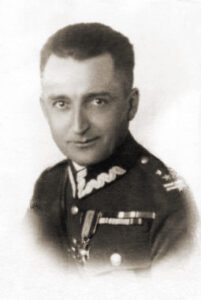“My father was very righteous. He did not tolerate lying. He was a very brave man, a man of honour. He loved his homeland very much. Cheerful, slim, very handsome, he had great success with the ladies”. These are the words of Maria Fieldorf-Czarska about her father, General August Fieldorf.
The future general was born on 20 March 1895 in the-then Austrian city of Kraków. Between 1914 and 1917, he fought in the ranks of the Polish Legions and then in the Austro-Hungarian Army. From 1918, he was a member of the Polish Military Organisation and a soldier in the Polish Army. By 1939, he had reached the rank of lieutenant colonel.
During the Polish campaign, he commanded the 51st Infantry Regiment of Border Riflemen; after the campaign ended, he made his way to Hungary, and from there to France. After the defeat of the French in the battles against the Germans, he went to Great Britain, where he soon became the first emissary of the Polish government and Commander-in-Chief of the Polish Armed Forces. In Poland, he held command posts in the Union for Armed Struggle, and in the years 1942-1944 he headed the Kedyw, or Diversion Directorate, a special unit of the Home Army which was famous for, among other things, liquidating Franz Kutschera – the SS and police commander of the Warsaw district. In 1944, he began to create the “NIE” organisation to function under Soviet occupation. He also fought in the biggest uprising in occupied Europe – the Warsaw Uprising.
On 7 March 1945, he was arrested by the NKVD under the false name of Walenty Gdanicki. The Soviets did not realise who they had actually arrested. So, he was treated like most Soviet prisoners: taken to the NKVD camp in Rembertów and eventually sent to the gulags in the Urals. He stayed in three camps: Beryozovka, Stupino and Hudiakovo. He returned to Poland in October 1947.
After another three years of living under a false name, he decided to come out on 3 May 1950. Six months later, he was arrested by the Public Security Office. Subjected to a brutal investigation, he was accused in a rigged trial. He was sentenced to death by hanging on 16 April 1952. To his wife he said: “Remember not to ask them for mercy! I forbid it.” The sentence was carried out on 24 February 1953 in a prison in Warsaw’s Mokotow district. His only request before death was: “Please inform my family”.




